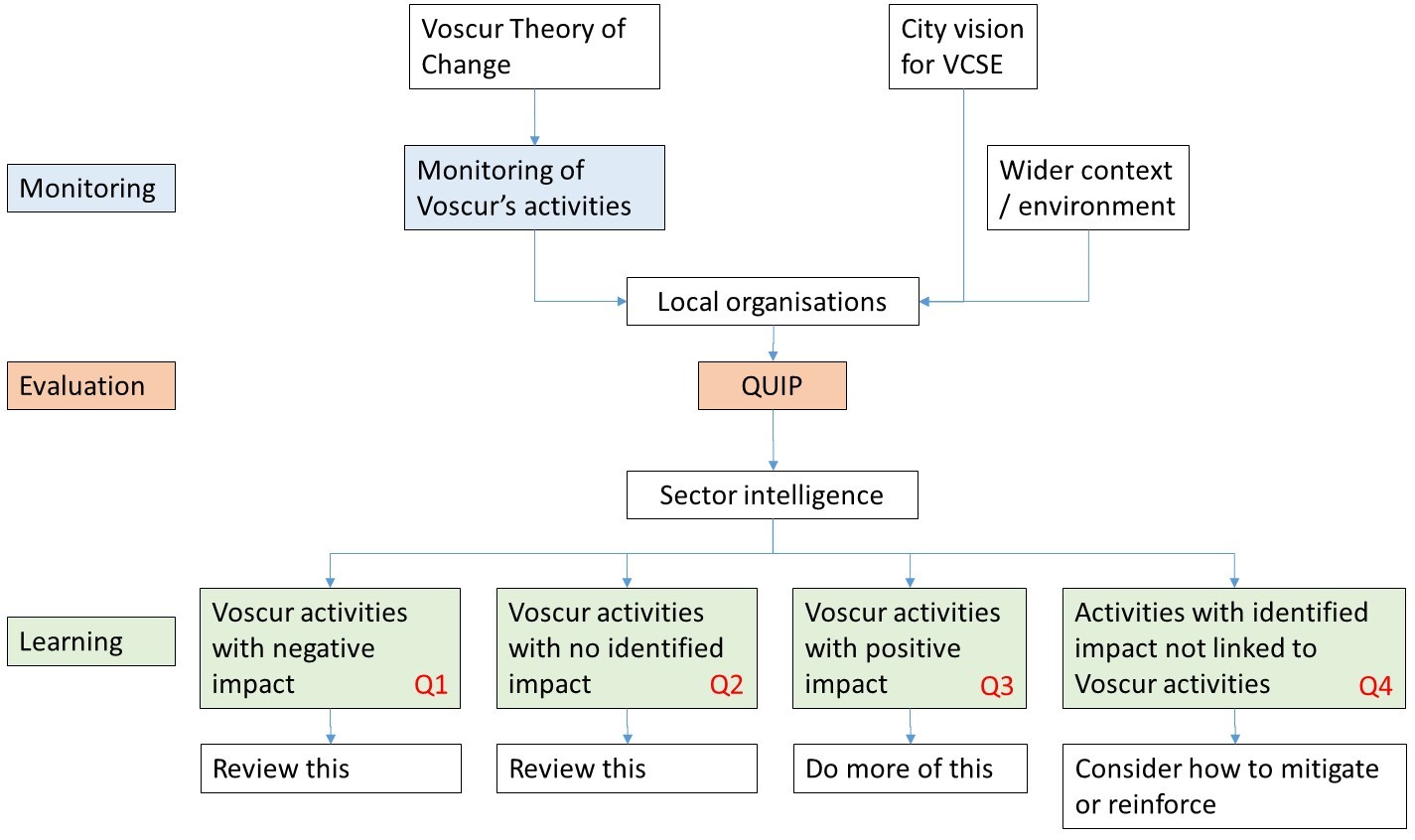Global to Local: Adapting QuIP for the UK voluntary, community and social enterprise sector
| 27 June 2017 | Latest QuIP News
The UK’s voluntary, community, and social enterprise (VCSE) sector spends around £40bn (NCVO UK Civil Society Almanac – https://data.ncvo.org.uk) on delivering services to some of the UK’s most marginalised communities and individuals. Like their counterparts in the global development sector, organisations in the UK voluntary sector face challenges in understanding their contribution to change and the lasting impact of their work; social change is complex and non-linear, so how can we judge what it is that drives identifiable change in particular circumstances? The ‘attribution challenge’ hits smallest organisations the hardest, those who are also under the most pressure to prove their worth in the context of funding reductions.
Although the QuIP was designed to meet the needs of international NGOs, from early on it was clear that there was potential to adapt the QuIP to meet UK VCSE needs. The first step in this plan was a trial with Voscur during 2016/17. Voscur supports the development and growth of the VCSE sector in Bristol, offering training, advice, 1-2-1 intensive support, advocacy and networking opportunities to their 700 members. A QuIP for Voscur needed to help them understand:
- The wider changes affecting Bristol’s VCSE sector
- The extent to which organisational development has occurred within Voscur’s members
- The impact of Voscur’s support on VCSE organisations
- How Voscur can adapt its service to be more effective to meet its members needs
A standard QuIP study interviewed respondents at a household level, asking them about changes, and drivers of those changes. In this case the ‘respondents’ to the qualitative interviews were organisations supported by Voscur, reporting on what had changed within and outside the organisation, and what they felt had contributed to that change. Whilst the trial was not conducted entirely blindfolded, the interviews were open-ended and exploratory – pitched as a ‘state of the sector’ evaluation.
The trial yielded very interesting results and Voscur’s funder, Bristol City Council, are keen to see it being incorporated into Voscur’s on-going monitoring, evaluation and learning approach for the next three years. The diagram below demonstrates where QuIP fits into Voscur’s work and the broader vision of Bristol City Council
Key highlights:
- The QuIP allowed Voscur to generate clear impact stories through case studies
- VCSE organisations said it gave them the time and space to reflect on changes in their organisation, both positive and negative
- Voscur was able to understand and separate their contribution to change from other ‘actors’ in the sector in Bristol i.e. consultants, Bristol City Council, funders, etc.
- Voscur was able to highlight services that were less effective than others
- A flexible approach to the analysis protocol allowed Voscur to adapt the standard reporting approach to meet their needs, including the ability to break findings down by organisational size, turnover and area of work
BSDR will be supporting Voscur over the next three years to carry out annual QuIP studies. There are some challenges that still need overcoming in supporting wider adoption of this approach:
1. Lack of specialist monitoring, evaluation and learning expertise within small organisations
2. Internal resources (time and financial) to deliver a QuIP study
3. Finding and blindfolding researchers to conduct qualitative interviews
4. Embedding the process as a learning approach for staff teams
We’d like to engage with UK VCSE organisations to find out how they think we can address some of these issues, and particularly from those providing services to individuals who may be interested in running further trials with BSDR. The trial was also featured in a report (Using QuIP to gauge success in complex contexts – June 2017) written by Marlies Morsink, who is studying a Master of Research in Social Policy at the University of Bath.
For more information please contact Ed Howarth, QuIP Project Manager on ed@bathsdr.org.




Comments are closed here.